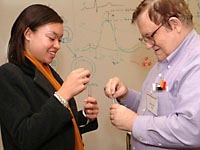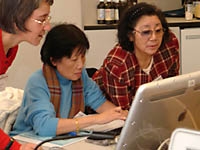
NYC teachers simulate the spread of HIV virus in the HIV Transmission lab.
On Nov. 15, the Outreach Office of Weill Cornell Graduate School of Medical Sciences held its annual "November Workshop for Biology Teachers"—a one-day professional development event for New York City high school teachers sponsored by the Pfizer Foundation—at Weill Cornell. More than 85 teachers from all boroughs of New York packed Weill Auditorium, where they attended lectures and labs on cutting-edge biomedical science and learned methods of presenting to students in New York City public schools. Lectures were given by faculty from Columbia University and the Sloan-Kettering Institute, while hands-on labs were presented by alumni teachers from previous workshops and volunteer graduate students of the Graduate School.

NYC teachers perform restriction enzyme digests during the DNA Profiling lab.
During the event, teachers were given the opportunity to enhance their knowledge of topics they regularly present to their students. The first lecture was titled "Dopamine and Disorganized Thinking," presented by Dr. Sara Glickstein, Columbia University. In her presentation, Dr. Glickstein commented on the incidence and molecular basis of schizophrenia. Her lecture was followed by "Chemical Biology: Introducing the Power of Interdisciplinary Science to High School Students," given by Dr. Derek Tan, Tri-Institutional assistant professor, who focused on the introduction of chemistry into the biology curriculum of high school students.

NYC teachers study different anatomical and functional regions of the sheep brain.
Teachers also had a choice of attending three of six available hands-on labs designed to facilitate their use of labs in the high school classroom. These labs are explained in detail below:
"DNA Profiling" (Teachers performed a DNA digestion, which simulates two paternity tests using state-of-the-art electrophoresis equipment to separate and visualize the DNA "fingerprints.")

NYC teachers utilize computer facilities at Weill Cornell to study meiotic crossover in the yeast Sordaria.
"HIV Transmission" (This lab utilized sodium hydroxide and phenolphthalein to simulate the transmission of the HIV virus between individuals, with a "pink" reaction simulating a positive HIV test.)
"Catalase Lab" (Teachers studied hypothesis formation and data analysis utilizing hydrogen peroxide and the catalase enzyme crudely extracted from potatoes.)
"Brain Dissection Lab" (Teachers learned the major regions of the brain through dissection of the sheep brain.)
"Yeast Crossover Lab" (This lab highlighted the crossing-over process during meiosis using the yeast Sordaria, which comes in two color varieties, allowing easy visualization of crossover cells.)
"The Plant Game" (Teachers learned the decisions made by plants throughout the growth season—whether to build roots, leaves or flowers.)
Teachers participating in the "November Workshop for Biology Teachers" agreed that the event was informative as well as useful. Many teachers indicated their desire to return for the next event in January, while others requested visits from the Outreach Office staff to come and present labs in their classrooms!
Photos by Amelia Panico.

